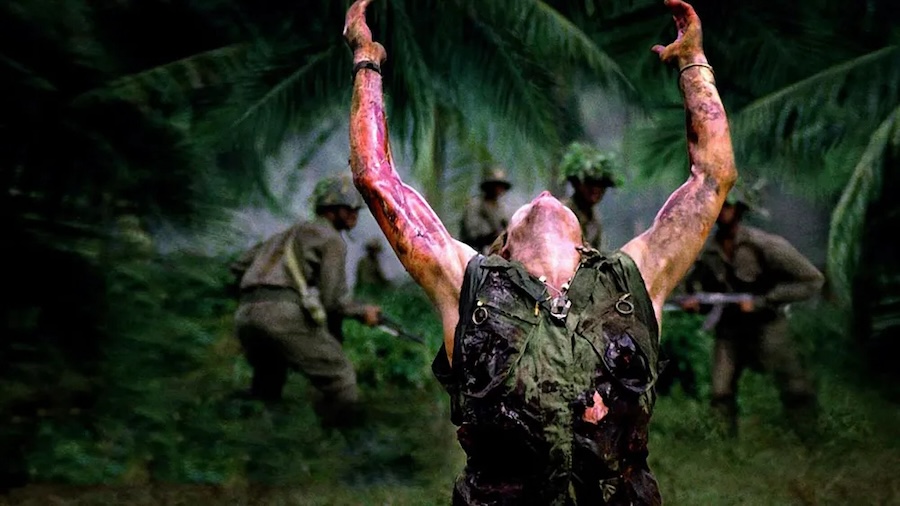
THE FIRST CASUALTY OF WAR IS INNOCENCE.

After serving in Vietnam, earning a Bronze Star as well as a Purple Heart, Oliver Stone came back to the United States in 1968. Disgusted with the way the war was portrayed by John Wayne in the now infamous Green Berets that year, Stone wrote down his experiences. He had a breakthrough as a screenwriter, earning an Oscar for Midnight Express (1978), but it would take another decade until he got the financing to make Platoon. Along with Apocalypse Now (1979) and The Deer Hunter (1978), it became the seminal film about this war.
Greeted by body bags
In 1967, Chris (Charlie Sheen) has dropped out of college and joined the U.S. Army, requesting combat duty. As he and the other fresh grunts disembark after flying to Vietnam, they’re greeted on the tarmac by body bags and the worn-out look of soldiers they’re replacing. Chris is headed for Bravo Company, which is near the Cambodian border. One of his first experiences of the sticky, mosquito-infested jungles is a nightly encounter with a North Vietnamese patrol that leaves one of the other kids Chris arrived with dead. He’s beginning to wonder if coming to this hell-hole was a smart move, but he soon becomes one of the gang, hanging out with the friendly Sergeant Elias (Willem Dafoe) and his compadres.
However, he’s also learning that there’s a rift between Elias and another sergeant, Barnes (Tom Berenger), a scarred, brutal warrior.
Peer pressure does its part
There seems to be a special connection between the Sheen family and the Vietnam War; both Martin and Charlie went through rough times in the making of this one and Apocalypse Now and both of them narrated the films. Sheen’s character is obviously a thinly veiled version of Stone who also dropped out of college to fight in the war. In his portrayal of the men he fought with, the director wisely makes a point out of the fact that many of them didn’t have an opportunity to choose. Wars have always been fought by those who are too poor to do something else. This has consequences, especially in that horrifying scene in the village where Barnes commits his crimes, cheered on by other soldiers who lack the training how to handle difficult encounters with locals. The peer pressure does its part; Chris falls into the trap after just a short while in the country.
That part of the movie happens a little too fast, though, and there are other moments in Stone’s depiction of Bravo Company and their behavior that don’t ring one hundred per cent true. That’s not to diminish his experiences, but rather a testament to the fact that in 1986 Stone still had some learning to do as a director.
Still, Platoon is a powerful film and it certainly filled a need among the general public who hadn’t seen many straightforward depictions of life in Nam for a regular grunt; after all, Apocalypse Now had an artsy touch that did not connect with the experiences of most veterans. The filmmakers capture their life in the jungle, complete with mosquitoes, rain and the mental burden of not knowing when the shadowy enemy will strike.
Oliver Stone may not always be dead on, but the actors are very good and he knows how to wring every last emotional drop out of the music.
The battle between Barnes and Elias takes on mythical qualities, with the latter even being described as a “water-walker” (cue Jesus symbolism, etc.). Stone may not always be dead on, but the actors are very good and he knows how to wring every last emotional drop out of the music; Samuel Barber’s “Adagio for Strings” is employed in a way that burns it into your memory forever.
Platoon 1986-U.S. 120 min. Color. Written and directed by Oliver Stone. Cinematography: Robert Richardson. Editing: Claire Simpson. Cast: Tom Berenger (Sergeant Barnes), Willem Dafoe (Sergeant Elias), Charlie Sheen (Chris Taylor), Forest Whitaker, Francesco Quinn, John C. McGinley, Kevin Dillon, Johnny Depp, Tony Todd.
Trivia: This film is the first in a trilogy of Vietnam War movies by Stone; the other two are Born on the Fourth of July (1989) and Heaven & Earth (1993). According to Stone, he tried to get this movie made in the 1970s with Sidney Lumet directing and Al Pacino in the lead. James Woods, Mickey Rourke, Keanu Reeves and Kevin Costner were considered for roles.
Oscars: Best Picture, Director, Film Editing, Sound. BAFTA: Best Direction, Editing. Golden Globes: Best Motion Picture (Drama), Director, Supporting Actor (Berenger). Berlin: Best Director.
Last word: “Out of nowhere there was this people’s revolution. I mean, I was happy for the people in the Philippines, but it really threatened our shoot. We had made all of these deals with the military. And when the change came, we had to make new deals with the new military. You had to get a lot of permissions and bribe a new set of people. I remember the helicopters were pretty dangerous because they weren’t maintained well.” (Stone, Entertainment Weekly)
